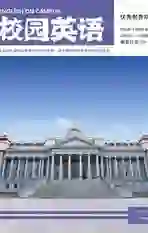On Lin Yutang’s Translation Thoughts from the Perspective of Eco—translatology
2016-07-09成倩
成倩
【Abstract】In 2006, Professor Hu Gengsheng has proposed the concept of Eco-translatology, which is a new arena for scholars to explore and develop. According to Professor Hu, translation is described as a translators adaptive and selective activities in a translational eco-environment. This thesis consists of the following two parts. Part One: It analyses translators selective adaptation, which will preserve the characteristics of the original culture to make the translation version more convincing. Part Two: It analyses translators adaptive selection, which will wipe out some expressions and customs inconsistent with the targeted culture to render the translation version more intelligible. The adaptive transformation will be analyzed from three dimensions——linguistic dimension, cultural dimension and communicative dimension.
【Key words】Eco-translatology; selective adaptation; adaptive selection
1. Introduction
Traditional Chinese people believe in the theory that man is an integral part of nature. In the 1980s, people in western countries put forward the concept of attaching great importance to ecology in translation studies. In 2006, the concept of Eco-translatology came out. It stresses on the integrity of ecological translation from the perspective of translational ecological environment. The framework of Eco-translatology lies in translators selective adaptation and adaptive selection.
2. Selective adaptation
The course of translation is kind of adaptation to original text, original ecological environment, targeted text and targeted environment. Above all, western philosophers hold in esteem Chinese Confucianism and Taoism, which stimulates their aspiration for further insight into Chinas literary works. The Good Earth written by Pearl S. Buck won Nobel Prize for literature, which promoted the trend for exploring Chinese culture. In addition, Lin Yutang himself endeavored to study on Taoist philosophy in the pursuit of inner peace and harmonious unity. At length, Lin Yutang had to adapt to the social requirements in his course of translation. He translated many household works such as Floating Life, My Country and My People, The Wisdom of Confucius and the most renowned masterpiece—Moment in Peking.
3. Adaptive selection
According to the theory of Eco-translatology, translation refers to a selective activity of translators to adapt to the ecological environment of translation, among which the core is selection and adaptation. The three dimensional transformations refer to linguistic dimension, cultural dimension and communicative dimension.
3.1 Linguistic dimension
Chinese and English belong to different family of language. In spite of their differences in morphology and syntax, Chinese and English have some similarities in terms of word order, which will promote the adaptive transformation in linguistic dimension. For instance, the following two phrases “和气生财”“忍为家训”can be translated into “ peaceableness brings good luck ” and “ patience is the best family heritage ” by Lin Yutang. He showed Chinese values vividly through accurate grasp and usage of language.
3.2 Cultural dimension
In Moment in Peking, the adaptive selection of cultural dimension can be found in many paragraphs. For example, “ And in the trunks were bridal jacket in Chinese red silk with fine-colored embroidery of twin lotus flowers, a bridal shoulder piece of varicolored cloud design.” This is the description of Mannis wedding dress. “祥云”is a cultural symbol in the history of traditional China, expressing happiness, peace and good fortune. Lin Yutang used “ varicolored cloud ” to reflect“五色祥云”,which can both preserve traditional Chinese culture and conform to western thinking pattern.
3.3 Communicative dimension
The adaptive selection of communicative dimension can be clearly seen in the processing of translating Chinese into Roman Pinyin, such as磕头( koutow )、进士( chinshih )、翰林
(hanlin). In order to reduce reading obstacles for westerners, Lin Yutang usually gave comments besides Roman Pinyin, which is a practical and essential method.
4. Conclusion
As the indigenous theory of Eco-translatology develops rapidly in China, more and more researches will focus on translation study from this perspective. Lin Yutangs translation thought is just a case of this kind. The integrity of translational ecological environment should be considered in terms of translators selective adaptation and adaptive selection. It will provide a newly-born perspective for translation studies as well as improve the research into Lin Yutangs translation thoughts.
References:
[1]Cafford,J.C.A Linguistic Theory of Translation[M].London:Oxford University,1965.33.
[2]Gentzler,Edwin.Contemporary Translation Theories[M].London & New York:Routledge,1993.82.
[3]胡庚申.翻译适应选择论的哲学理据[J].上海科技翻译,2004,(4):2-3.
